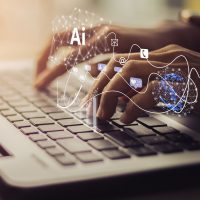The Artificial Intelligence industry presents multiple opportunities for the public sector. Today, governments provide e-government services to citizens, such as voting, utility and tax payments, license, and new business registration. One advantage that AI will contribute to this sphere is that it would help improve the economy. Also, it will automate many redundant tasks, which will give more time to public sector employees for more crucial tasks that require creativity for decision-making. The following are several examples of AI being already used by governments:
- Research
The government possesses vast amounts of unstructured data. Governmental research departments use natural language processing, a type of Artificial Intelligence, to classify and extract relevant data automatically. One example of AI in research is the Deep Exploration and Filtering of Text (DEFT) program developed by the US Department of Defense research agency.
- Health
Another area where governments can utilize AI is healthcare and life protection. Hospitals and other healthcare institutions struggle with the vast amounts of paperwork. Besides, there may be problems with data transfer of a patient from one institution to another. AI-based data storage may aid the situation by analyzing data more quickly and intelligently, which may later be used for making accurate diagnostics.
- Safety
The safety of citizens is of utmost importance for governments. AI is utilized by the public sector to prevent crime and protect people from natural disasters. More specifically, AI tools are able to detect where and when the natural disaster will occur and warn people. The Japanese company Hakusan, a seismometer manufacturer, was able to turn phones into mobile seismometers. AI can also be used to improve public safety by detecting online content produced by terroristic groups.
- Sustainability
Major cities like Seoul, Singapore, and Boston have implemented smart waste management. The system alerts when the waste containers are full. In this way, the containers are emptied on-demand, rather than at a set schedule. This management system has improved the air quality and decreased transportation-related noise in these cities.
- Fraud detection and prediction
Combating fraud implies considerable spending of resources for governments. AI can also be of help in fraud detection and prediction in the public sector. For instance, the UK Department for Work and Pensions has implemented fraud detection automation to fight corruption and protect taxpayers’ money from criminals.
- Smart Cities
The cities of the future are likely to utilize the Internet-of-Things (IoT) infrastructure. In fact, many major cities are already moving towards that kind of infrastructure. The city of Amsterdam is using road traffic flow management and energy source management systems. Notably, Barcelona also implemented smart technologies like smart parking, light, and water management in their infrastructure.
These implementations are the beginning steps of Artificial Intelligence usage in the public sector. Along with all these advantages, AI also has great potential to be efficiently applied in mobility, environmental protection, and education. All mundane tasks can be automated, while people will take up the tasks that require creativity and critical thinking. The AI solutions will improve not only the quality of life of people but also make the cost and resource management of governments more efficient, contributing to the generations to come.

Rem Darbinyan is the Founder and CEO at SmartClick. He is a serial entrepreneur, angel investor, seasoned advisor, author, and keynote speaker with an investment portfolio of 40+ startups.


